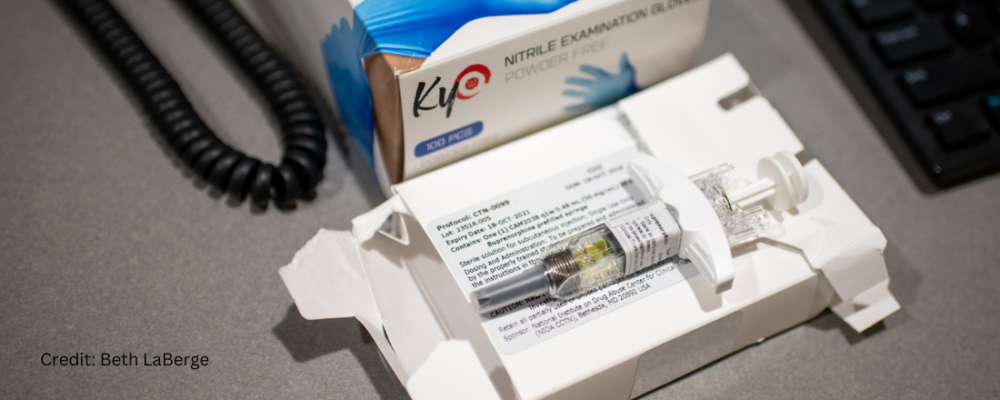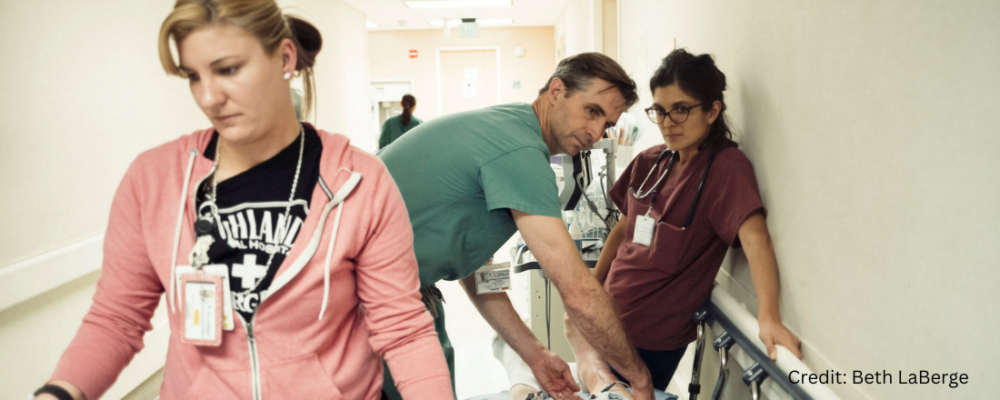
When Seconds Count: How Emergency Departments Can Revolutionize Reproductive Healthcare
- Elizabeth Keating, MPA
- Kelly Quinley
-
Focus Areas
Health Care & Population Health, Women, Youth & Children -
Issues
Reproductive & Sexual Health -
Programs
Bridge

Since the Supreme Court’s 2022 Dobbs v. Jackson Women’s Health Organization decision overturned a federal right to abortion, reproductive healthcare in the United States has devolved into chaos as large regions of the country find themselves without any local option for pregnancy and contraceptive care. This makes emergency departments (EDs) increasingly the only open door for women facing life-altering reproductive healthcare needs.
As a consequence, more and more patients are being turned away from EDs without proper care for a pregnancy emergency. This can be deadly. Amber Thurman died in Georgia in 2022 after the state’s strict abortion ban blocked medical providers from practicing life-saving care. Nevaeh Crain died after being denied care in three EDs in Texas.
These examples of preventable death and suffering underscore how ED-based reproductive healthcare stands at the forefront of reproductive health and rights in this country. As ob-gyns grow scarce, ED providers need tools and support to provide evidence-based reproductive healthcare and change the clinical culture to scale this practice change. This can be the difference between life and death.
In response, Access Bridge, where we serve as principal investigator and founding clinical implementation leader, is at the forefront of building this clinical and practice change, and we are scaling rapidly to meet this moment.
Contraceptive Deserts, Abortion Bans, and State-by-State Confusion
The rise in the importance of emergency departments in reproductive health is due in large part to the growth of maternal health deserts. One in three people of childbearing capacity live in contraceptive deserts, nearly half of US states restrict abortion care, and patients of color face worse outcomes across all reproductive healthcare metrics. These challenges converge in EDs, which are the sole healthcare settings legally required to treat anyone seeking care.
Emergency departments are the only part of the US healthcare system open to all, 24 hours a day, and they also disproportionately serve communities already marginalized by the healthcare system. According to a cross-sectional retrospective study, pregnant patients presenting to the ED are most likely to identify as Black or Hispanic, and/or to use public insurance.
Post-Dobbs, the power to control reproductive policies was returned to the states. Currently, 41 states have abortion restrictions in place. Of these states, 13 have total abortion bans. Most hospitals do not have procedures in place that advise doctors on how to interpret restrictive abortion policies, even in the case of emergencies.
Meanwhile, as the federal law that requires EDs to see anyone seeking care faces threats to its existence, far too often these departments send patients home without proper care. A 2024 analysis of federal hospital investigations revealed that at least 100 pregnant women who came to EDs since 2022 were sent home instead of receiving medical treatment.
And even where EDs are striving to meet the maternal health needs of their patients, they face a complex web of abortion laws and restrictions that lead to confusion, hesitation, and critical delays in care. These challenges are further compounded by rampant misinformation around reproductive care that has sprung up in the chaos created post-Dobbs.
Supporting Reproductive Care Where It Matters Most
Access Bridge was founded in the immediate aftermath of the Dobbs decision when it became clear that EDs could be a crucial access point for reproductive healthcare. Our organization offers clinical guidance, training, mentorship, and technical assistance to clinicians treating reproductive health needs from EDs nationwide. This allows ED clinicians, many of whom have limited training in reproductive healthcare, to provide evidence-based treatment when it is needed.
Since late 2022, our program has grown from a proof-of-concept pilot to a national movement, with operations in 29 states, including 12 with abortion bans. Our work enables ED clinicians to deploy ED-specific protocols and training on miscarriage, contraception, emergency contraception, ectopic pregnancy, and medication abortion, equipping clinicians to partner with patients to ensure the right care is delivered in the emergency department, centering patients and clinicians throughout the process while clarifying clinical decision-making in confusing or threatening legal landscapes.
Access Bridge also coaches clinicians on how to approach and educate their colleagues and departments in practice change, customizing the implementation of our protocols and decision-making tools to adapt to diverse practice settings. By organizing leaders and champions, the program empowers emergency medicine practitioners to provide the best evidence-based care for their patients no matter where they practice.
Reimagining Healthcare in Hostile Territories
To activate local leaders, in 2023 we launched a funded fellowship for motivated clinicians. Together, we have succeeded in every state where the protocols have been tested, including in hospitals with religious affiliations. Fellows in Access Bridge’s first cohort directly improved access to contraception and miscarriage management. Seventeen of 22 fellows administered, prescribed, or scheduled follow-up for contraception from the ED, reaching at least 325 patients. Seven fellows led work to ensure medications for miscarriage management (mifepristone and misoprostol) were available at their hospitals, and 17 directly administered this care to over 200 patients.
The fellows’ work set the landscape for future reform by leading culture change: they conducted grand rounds, led provider and staff trainings, and advocated for practice change through committees and to hospital administrations. Other early successes include medication abortion provision from the ED in states that have invested in expanding reproductive healthcare, implementation of mifepristone and misoprostol protocols in Texas and Florida hospitals, and invitations to deliver education in hostile states for reproductive rights including Georgia and Mississippi.
This reform works because patients want this care. In 2021, a cross-sectional survey conducted by an Access Bridge coach studied contraception initiation from the ED. A total of 505 patients were surveyed and 94 percent accepted having a doctor or nurse offer them contraception options in the ED. Anecdotally, physicians who have used Access Bridge protocols to counsel young patients on contraception have shared that the materials support their ability to practice patient-centered care.
Navigating an Uncertain Future
Misinformation and confusion about access and rights will continue to create barriers to reproductive healthcare in this ever-changing political climate. More states will lose ob-gyns, creating new care deserts for pregnancy care and contraception. There will be more fear, likely leading to fewer people using telehealth options even when they are available. The ED will increasingly become a critical access point for essential health services. Access Bridge will closely monitor policy and legal changes to access, and to the availability of mifepristone (used both for miscarriage management and medication abortion), and serve as a trusted source for our broad network of emergency medicine leaders.
There is no time to waste—we are scaling nationally, intending to reach all 50 states by 2027 while responding in real time to this evolving public health emergency. Our program leadership and growing team of Access Bridge fellows and ambassadors are driven to lead practice and culture change in America’s emergency departments. We are relentless in pursuit of our vision: when every ED in America is equipped to provide life-saving pregnancy care, we uphold healthcare as a human right.
Interested donors can reach out to ekeating@bridgetotreatment.org
Originally published by Nonprofit Quarterly
Work With Us
You change the world. We do the rest. Explore fiscal sponsorship at PHI.
Support Us
Together, we can accelerate our response to public health’s most critical issues.
Find Employment
Begin your career at the Public Health Institute.


